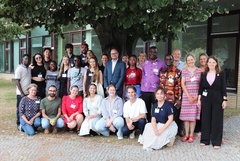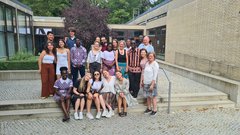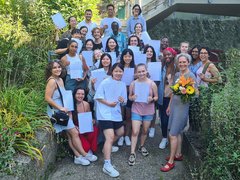Summer School

International Summer School at EHB

Next Program: SUMMER SCHOOL 2026
Debating Health & Care Services with Multidimensional Perspectives
Organized as a Blended Intensive Program in Erasmus+
August 24 - 28, 2026
COORDINATING UNIVERSITY: Evangelische Hochschule Berlin (Germany)
We are pleased to announce in advance that the 2026 Summer School will take place under the new academic leadership of Prof Dr Sven Lück, Head of the Bachelor of Nursing (B.Sc.) program, and Prof Dr Thomas Guthmann, Head of the Social Work (B.A.) program.
Stephanie Palm from the International Office will serve as the organizational head of the program.
ABOUT THE PROGRAM
The International Summer School 2026 offers a one-week intensive program focused on interdisciplinary exchange around sustainable health and social care systems, with a particular emphasis on prevention.
The program fosters dialogue between various disciplines—including social work, education, healthcare, public transport, environmental studies, and culture—to explore innovative approaches for resilient, prevention-oriented care structures.
THEMATIC DIMENSIONS
Each session examines public health and care systems from an international perspective across four interconnected dimensions:
- Structure: Infrastructure, mobility, urban development
- Culture: Care practices, community, social norms
- Health: Personal, social, and environmental health
- Environment: Climate protection, sustainable food systems
The aim is to develop networked, interdisciplinary, and prevention-driven strategies that are both theoretically grounded and practically feasible.
TEACHING APPROACH
In accordance with the Erasmus+ Blended Intensive Program (BIP) framework, the Summer School combines:
- Expert lectures and panels
- Interdisciplinary group work
- International case study comparisons
- A practical field excursion
- Creative presentation formats (e.g., podcasts, performances, short films)
Social and cultural exchange is also part of the experience, including sightseeing activities in Berlin for international participants.
PROGRAM DETAILS
- Duration: 1 week (Monday–Friday), including field excursion
- Credits: 3 ECTS
- Preparation: Virtual preliminary meeting (dates to be announced)
- Application deadline for students: May 1, 2026
- Target group: International students, academic staff, practice partners
We are confident that the combined expertise of our academic and organizational team will offer participants valuable insights, exciting exchanges, and a truly enriching international experience.
ONLINE INFORMATION MEETING
The online meeting for the International Summer School will take place on
- May 22, 2026 at 1:00 PM (CEST)
TUITION FEES
For exchange students sent by our Erasmus partner institutions, this course is tuition free. For overseas and non-exchange students, please contact our International Office.
REQUIREMENTS
The course is open to all students who speak and write English at B2 level.
FURTHER INFORMATION AND APPLICATION:
- Application Summer School 2026: REGISTRATION FORM SUMMER SCHOOL 2026
- Contact: stephanie.palm@eh-berlin.de
SUMMER SCHOOL 2024:
Global Health: Perspectives for Human Rights-Based Healthcare
Organized as a Blended Intensive Program in Erasmus+
August 19–30, 2024
COORDINATING UNIVERSITY: Evangelische Hochschule Berlin (Germany)
PARTICIPATING UNIVERSITIES:
- CHE Christlijke Hogeschool Ede (The Netherlands)
- Tunghai University (Taiwan)
- University of Education, Winneba (Ghana)
- IDHEP – Institut de Développement et des Hautes Etudes de Paris (France)
- Thomas More (Belgium)
- Andrzej Frycz Modrzewski Krakow University (Poland)
- Akademia Nauk Społecznych i Medycznych w Lublinie (Poland)
- Bjelovar University (Croatia)
- University of Applied Sciences for Health Professions Upper Austria (Austria)
- UCL Erhvervsakademi og Professionshøjskole (Denmark)
- Istanbul Kent University (Turkey)
- Akdeniz University (Turkey)
- Riga Medical College of the University of Latvia (Latvia)
- PXL University of Applied Sciences and Arts (Belgium)
- University of Tartu (Estonia)
The International Summer School offers a two-week program that focuses on the global diversity of health care and health systems.
Common trends such as economization, aging populations, climate change, shortage of skilled professionals, migration and refugee flows, as well as the increasing impoverishment of populations, will play an important role in the program.
The program focuses on the perspective of human rights. These topics will be discussed from different professional angles and in an international exchange with students and teachers from different countries.
At the end of the program, a workshop about future outlooks will explore perspectives and models that can function as solutions regarding these urgent issues of global health care.
All students from bachelor and master programs from EHB partner universities who are involved in or interested in health care issues are cordially invited to participate in this dialogue.
SUMMER SCHOOL 2024: Global Health: Perspectives for Human Rights-Based Healthcare, organized as a Blended Intensive Program in Erasmus+ (August 19-30, 2024)
COORDINATING UNIVERSITY: Evangelische Hochschule Berlin (Germany)
PARTICIPATING UNIVERSITIES: CHE Christlijke Hogeschool Ede (The Netherlands) | Tunghai University (Taiwan) | University of Education, Winneba (Ghana) | IDHEP – Institut de Développement et des Hautes Etudes de Paris (France) | Thomas More (Belgium) | Andrzej Frycz Modrzewski Krakow University (Poland) | Akademia Nauk Społecznych i Medycznych w Lublinie (Poland) | Bjelovar University (Croatia) | University of Applied Sciences for Health Professions Upper Austria (Austria) | UCL Erhvervsakademi og Professionshøjskole (Denmark) | Istanbul Kent University (Turkey) | Akdeniz University (Turkey) | Riga Medical College of the University of Latvia (Latvia) | PXL University of Applied Sciences and Arts (Belgium) | University of Tartu (Estonia)
The International Summer School offers a two-week program that focuses on the global diversity of health care and health systems. Common trends such as economization, aging populations, climate change, shortage of skilled professionals, migration and refugee flows as well as the increasing impoverishment of populations will play an important role in the program. We focus on the perspective of human rights. These topics will be discussed from different professional angles as well as in an international exchange with students and teachers from different countries. At the end of the program, a workshop about future outlooks will search for perspectives and models that can function as solutions regarding these urgent issues of global health care. All students from bachelor and master programs from EHB partner universities who are involved or interested in health care issues are cordially invited to participate in this dialogue.
According to the Erasmus+ Blended Intensive Programs guideline, this event is based on a multidimensional and interdisciplinary teaching approach. In addition to group work sessions which will compare international experiences and practices, there will be experts from the different focus areas invited to share insight into theory and practice. Furthermore, field excursions to different health care institutions are planned. Berlin sightseeing will also be included as an extracurricular activity for our international participants. Students will receive 5 ETCS points for the successful participation in the program after completing a performance evaluation.
Impressions from the Summer School 2024

Global Health: Perspectives for Human Rights-Based Healthcare (first week)
The first week of the International Summer School flew by in a breeze. Magdalena Scharf led the opening session, introducing everyone and setting the thematic framework. The exercises focused on group dynamics, intercultural exchange, and teamwork, bringing movement, fun, and relaxation, leaving the students and instructors cheerful and at ease after just three hours.
Tuesday’s seminar on “Challenges of Digitalization in the Health Sector” was a hybrid session, with some participants in Berlin and two speakers joining us online. Prof. Dr. Olivia Dibelius spoke about the “Challenges of Telecommunication in the Health Sector: Questions of Human Rights.” One key question from the audience was why the German healthcare system, particularly in telecommunications, is developing more slowly than other EU countries, despite the “digital pact” by the German government.
Barbara Huelat, an architect based in the USA, joined us online to present on “Healing Environments for People with Dementia.” Her lecture touched on findings from memory research and environmental design for people with dementia, such as smart homes. Many aids already available in households support the independence of people with disabilities, allowing them to stay in their own homes longer. However, in the USA, only those from the middle and upper classes can afford these. From a human rights perspective, this represents inequality in access to and provision of support in old age.
Prof. Dr. Ying-Chyi Chou from Tunghai University in Taiwan spoke about the role of robots in an aging society. The presentation of robots already in use in various settings amazed the students, while also sparking lively and, depending on cultural background, controversial discussions about resistance to these changes and their implications for various healthcare professions. In the African context, nurses share similar fears with their European counterparts that the introduction of robots could lead to job cuts.
Wednesday was dedicated to student assignments. Each group had prepared a poster outlining the strengths and weaknesses of their respective healthcare or education systems. The systems in the EU, classified as “social insurance systems,” exhibit similar strengths, such as the principle of solidarity, as well as similar weaknesses. For instance, Germany and Austria have the highest healthcare expenditures globally yet are less efficient than other countries with lower expenditures. There was criticism of the privileges of privately insured patients, who often get faster appointments and better services, which contradicts the principle of solidarity and the human right to equitable access to resources. In the Ghanaian healthcare system, there are also private and public sectors. However, a large number of people, due to religious or financial reasons, avoid the “traditional” healthcare system and instead turn to “healers.” There are two groups of healers: those who work with plants and those who use religious ceremonies. Healers who work with plants must have completed a certification at a university. A discussion arose about whether there is communication between these systems or if traditional and alternative medicine operate separately.
On Thursday, Gerdien de Nooijer-Gijsbertsen, MSc, from Ede Christian University of Applied Sciences spoke on “Palliative Care.” The session focused particularly on why death is so feared and sometimes tabooed in Western European countries. In Ghana, dealing with death and dying is more common and accepted. The euthanasia regulations (active euthanasia) in the Netherlands and Belgium are practiced according to six criteria. These regulations create an expectation among those affected, often leading to dilemmas and significant burdens for doctors and nurses. So far, these two countries, along with Switzerland, have a unique stance on active euthanasia. The hospice movement offers a different approach to end-of-life care, focusing on providing people with a pain-free, high-quality end-of-life experience. A moving video titled “A Day in the Palliative Care Unit” was shown to illustrate this approach.
Dr. Fred Yao Gbagbo from the University of Education, Winneba (UEW), spoke about “Funeral Ceremonies” in Ghana. The deceased are honored by building a coffin that reflects their professional life; for example, an airplane might represent the life of a deceased pilot. Funerals also include a strict dress code and a large meal afterward. In Ghana, such elaborate funerals can pose a risk of debt and are usually only held in this way by wealthy people, reflecting a class system that was questioned by the students.
On Friday, Klaus Nigl, M.A., from the University of Applied Sciences for Health Professions Upper Austria discussed “Globalization with the Beginning of Colonization Using the Example of Cocoa: A Postcolonial Approach Regarding Nutrition Culture and Arts.” He talked about the over 5,000-year history of chocolate, focusing on the former colonies – the countries of origin of the cocoa bean – and the production processes, which mostly take place in tropical countries. There is only one small production facility in Africa, located in Ghana; otherwise, the cocoa beans are processed in industrialized countries. The nutritional aspects of chocolate were analyzed, and potential health consequences were highlighted. The seminar concluded with a tasting of chocolates from various regions, offering a sensory experience that rounded off the event.
Prof. Dr. Zrinka Puharic from the Bjelovar University of Applied Sciences spoke about childhood obesity in Mediterranean countries, particularly in Croatia. Despite good preventive measures and medical care, there is a disproportionately high number of affected children in these regions. Discussions focused on education, poverty, and family eating habits, such as fast food. The importance of preschool and school socialization in education and healthy school meals was emphasized.
On Friday evening, a transcultural picnic was held in Berlin’s Gleisdreieck Park. The students brought typical dishes from their countries, and there was a joyful atmosphere on this beautiful summer evening, which encouraged lively exchange.
Looking back, the first week was a great success. The sessions were varied and engaging, and the students were very interested, open-minded, and produced interesting results in their working groups. We look forward to the continuation in the second week.
Prof. Dr. Olivia Dibelius (August 25th, 2024)

Global Health: Perspectives for human rights-based healthcare (second week)
The second week started on Monday with a presentation by Prof. Dr. Olivia Dibelius from EHB, who spoke about Recruitment, Migration and Integration of Nurses. Win-Win or Brain Drain?. In view of the worldwide shortage of professionals and the inequalities between the Western world and the countries of the global South, human rights issues arise, not least from a post-colonial perspective. The rich countries benefit from the poorer countries by incentivising them through better wages and a better-funded healthcare system. The Ghanaian colleagues reported on the self-discrimination practised in their country. People with degrees from European universities are favoured over their own employers. They also do not have to overcome any administrative hurdles to have their degrees recognised. The following questions arose against the background of the research project on Mexican nurses working in Germany led by Prof. Dr. Olivia Dibelius and Prof. Erika Feldhaus-Plumin:
- What entry requirements must nurses fulfil in order to work in Germany? What are the labour conditions?
- Shouldn't the country agreements also anchor the ‘triple win idea’ even more firmly? After all, it is undisputed that there must also be a return flow of knowledge and employees to the countries of origin.
- Despite all this, how can the human right to migration be guaranteed?
The topic of Poverty and Health was offered by Dr. R. Agjei from the UEW University of Education in Winneba (Ghana). He presented the different types of poverty, definitions of absolute and relative poverty and their far-reaching consequences for quality of life and health. Poverty takes different forms depending on cultural background. A video example of a neighbourhood in Accra showed the coexistence of wealth and poverty, which led to a debate on good governance and democratic institutions in the context of poverty reduction in Africa. The issue of increasing homelessness in European cities was also addressed.
On Tuesday, Dr. Fred Yao Gbagbo from the UEW University of Education in Winneba (Ghana) spoke about Sexual Coercion and Harassment of Students with Disabilities. His empirical study on questions of awareness, experiences and dealing with sexual harassment comes to the conclusion that sexual harassment occurs relatively frequently among students and that students with disabilities are particularly often affected. Universities should have their own policies and procedures to address this issue. Dr. R. Majka from Andrzej Frycz Modrzewski Krakw University gave a presentation on Community-Based Organisations and Health Contexts of LGBTQI+Community. He used examples to demonstrate good community-based healthcare. These include Deutsche Aids-Hilfe and Afrolebenplus (in Germany), ALDES (in France) and the Stonewall Clinic (in Poland). In a country comparison, issues of liberal drug policy and abortion were discussed in the context of human rights and prevention / therapy.
The topic of Heat Protection in Health Care was presented on Wednesday by Prof. Dr. Cornelia Heinze and Prof. Dr. Sven Lück from EHB. The causes, human rights and the far-reaching consequences for health were discussed. Ria Bruijn (Lecturer nursing & midwifery) from the Thomas More University of Applied Sciences in Belgium, who was connected online, also addressed human rights and so-called risk groups. Recommendations for governments and protective measures were also presented.
On Thursday, Prof. Dr. Olivia Dibelius from EHB presented Images of Old Age and People with Dementia. She spoke about images of old age as a social construction and images of self and others in a country comparison (countries in Europe and Zimbabwe). In the western world, the image of old age tends to be characterised by deficits and older people are confronted with many stereotypes. The positive image of old age that prevails in Africa helps older people to interact better with their extended families and society. However, in the wake of the global economy, younger people often move to urban centres and older people are left behind in rural areas without support. Most younger people are also unable to support their parents financially. In some African countries, such as Ghana, there is health insurance but no long-term care insurance. In these regions, this harbours not only a risk of care but also a risk of impoverishment for older people.
Dr Fred Yao Gbagbo and Dr. R. Agjei from the UEW University of Education in Winneba (Ghana) gave a lecture on Demographic Changes and Health Care Perspectives. The challenges, particularly for the healthcare systems of ageing continents such as Asia and Europe in comparison to the younger continent of Africa, were highlighted and discussed.
On Friday, Magdalena Scharf invited the students and lecturers to a personal and group evaluation of the International Summer School. Using the World Café method, there was an opportunity to reflect on human rights, the personal benefits of the Summer School for professional development and the transfer and future relevance. The presentation of certificates and a joint farewell dinner were the grand finale. The atmosphere ranged from cheerful to exuberant and everyone was delighted with the successful collaboration and shared experiences. Some students made friends and will meet again.
One student who took part in the Summer School described her experiences as follows: ‘The Summer School was a great opportunity to expand my own knowledge of healthcare systems and at the same time get to know great people from all over the world. The topics were super diverse and the lecturers were very committed. Beyond the teaching units, friendships quickly developed among the participants and we were able to explore Berlin together as a group. Overall, a great way to gain 5 ETCS, I can recommend it to every student!’
Prof. Dr. Olivia Dibelius (August 31th, 2024)
Looking back at the Summer School 2023

International Summer School 2023: Health Systems in Focus - Looking at Degrees and Future Prospects
The 14 days of the Summer School flew by due to the creative working atmosphere during the seminars and workshops. Activating methods contributed to the fact that the initial language barriers of the students disappeared and the inter- and transcultural communication with global perspectives set in. For example, a "World Café" took place on the last day, the results of which confirmed: The Summer School was a success! The evaluation showed that the focus of the content as well as the organization, the personal approach, the working atmosphere, the professional excursions and the leisure activities were very well received. There is room for improvement in the selection of accommodations, assistance with transportation, expansion of recreational opportunities, and scheduling of student presentations. All students passed their presentations and received a certificate with 5 ECTS to the great joy of all (photo).
The results are an incentive to continue the Summer School at EHB, as they continue and deepen the internationalization processes started at EHB. They are a result of four years of international networking with European, African and Taiwanese universities carried out by the International Affairs and StrInGEnt team led by Tanja Reith and Martin Leutner. Regarding the engagement in the implementation of this year's Summer School, we would in particular like to thank our colleague Dr. Fred Yao Gbagbo from UEW/Ghana, who was present for two weeks, was able to give exciting insights into the Ghanaian health care system and distinguished himself as a very good process facilitator of the didactic procedures. He lectured on "Communication in nursing", "Brain drain", "Funeral culture in Ghana" and "Care of the elderly".
The colleague Prof. Dr. Chou Ying-Chyi from Tunghai University/Taiwan was able to accompany a group of students to Berlin, who excelled in the topics "Robots" and "Environment". The lecture of Vanessa Hébert from Ocellia/France and her students raised critical questions about the health care system in France, such as recognition of the profession, nursing emergency, palliative care and lack of permeability of recognition of professional qualifications of nurses and doctors from non-European countries. Students from Sorbonne Paris North University, most of whom have an African migration history, showed great sensitivity to intercultural and transcultural issues. In particular, they contributed on quality management that enriched the roundtable. Likewise, the Dutch group, presented the Dutch model, which is characterized by prevention, health promotion and good outpatient structures.
The EHB colleagues Prof. Dr. Kristina Dronsch, Prof. Dr. Dietrun Lübeck and Prof. Dr. Rebekka Streck brought in their contributions "Disabled God" and "Addiction/Mental Health", thereby strengthening the multidisciplinary orientation of the EHB team. Prof. Dr. Olivia Dibelius spoke about "digitalization", "elderly care", "impact of shortage" and provided the common thread during the two weeks. Two bachelor students of EHB, Wanda Reissbrodt (Social Work) and Ariane Karzek (Nursing) participated. They enriched the panel with their German perspective and were also ambassadors of the university’s student body.
Downloads & Links
Contact

Prof. Dr. med. Sven Lück
Position Professorship for medical basics | Head of the program Bachelor of Nursing
Telephone +49 (0)30 845 82 245
Email lueck@eh-berlin.de
Office House E, Room E 203

Stephanie Palm, M. A.
Position International Office | Deputy Erasmus Institutional Coordinator | Project Leader BRIDGES
Working areas Internationales / International Office
Telephone +49 30 585 985 683
Email stephanie.palm@eh-berlin.de
Office House E, Room E 116

Tanja Reith, M.A.
Position Head of International Office | Erasmus Institutional Coordinator
Working areas Internationales / International Office
Telephone +49 30 845 82 135
Email tanja.reith@eh-berlin.de
Office House E, Room E 116

Sophie Scheurer-Clark
Position Student Assistant, International Office
Email incoming@eh-berlin.de
Office House E, Room E 116
